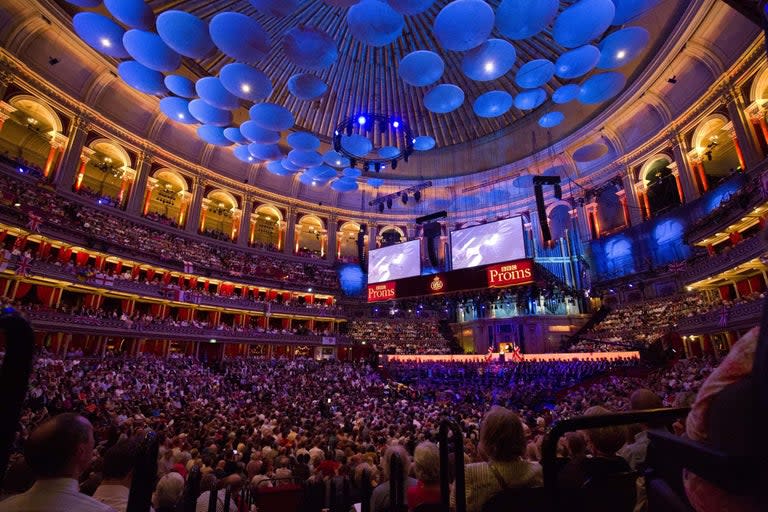The Proms remind us that live music is a communal pleasure
The BBC Proms season begins tomorrow, the crown jewel of London’s summer cultural calendar. It is the world’s biggest and most important classical music festival, attracting audiences of all ages from all around the globe. But beyond the statistics, the Proms is a perennial antidote to many misconceptions levelled against this art form: only for fuddy- duddies, of interest only to our grandparents, written by their grandparents — suburban, middle-classical music indeed, and the least sexy option for a night out for anyone under 35.
We should dismiss the idea that attending a classical music concert is some sort of genteel, bourgeois pastime. The composers whose works we play were often radicals and outsiders, and frequently young when they were writing. Schubert died in poverty from syphilis aged 31 having composed around a thousand works. To become involved with classical music can be one of the most daring, exciting, transgressive things a human being can do — even if this transgression does require some effort from the listener.
It’s not a Sunday drive around the park in third gear; more like a circuit of a Formula One racetrack. It can set your pulse racing. It can, it should change your life, but at no risk to your life.
Music reaches us in ways we can’t fully explain. Words fail — then music becomes eloquent. Sitting at a concert we become overwhelmed with indescribable feelings, and then we realise that we don’t need to describe them. The music itself has given expression to the inexpressible, whether of suffering or of sheer joy. In prosaic daily lives filled with words demanding our attention the poetry of music can engage our intellect and emotions at the deepest, most personal level.
And to go to a classical music concert with friends is more than just enjoying a night out in the company of people you like. Sharing any cultural event is an amplification of the experience, but, unlike a movie where something was made in the past and is fixed on a screen, in a concert the people on stage themselves share the experience with you. The audience matters to the performers. Not so much the applause or cheers (although please don’t feel you have to hold back) but because as you concentrate, we concentrate.
In the heat of the moment there occurs a snowballing of intensity tossed back and forth between us. There’s also an element of risk in the high-wire act of a live performance which can fill the air with a crackle of anticipation. It is a chef grinding, chopping, slicing in front of our eyes, rather than a ready-made meal’s predictability. And what a dinner we can have!
For those for whom classical music seems intimidating, even overwhelming, the Proms is a great starting point. Some concerts are undoubtedly an easier entry into this new world than others but none of the 75-plus programmes on offer over the next six weeks at the Royal Albert Hall will be without their appeal.
If you don’t mind rubbing shoulders with up to a thousand strangers you can stand close to the stage in the arena where, for the price of a cup of tea and a couple of biscuits, you can enjoy the best acoustics and sight lines in the house: £6 on the day, the best arts bargain in London. And although every Proms concert is broadcast “live” on BBC Radio 3 and online, nothing is quite the same as being in the hall itself as the lights darken and the orchestra tunes and the conductor or soloist walks onstage from the wings. Into the silence music emerges, in a burst of energy or with a whisper of enchantment.
"The poetry of music can engage our intellect and emotions at the deepest, most personal level"
I’ve played in the Proms nearly 30 times now and this year we’re doing something special for the 200th anniversary of Queen Victoria, who had this hall built in memory of her music-loving husband, Prince Albert. We have been given permission to bring to the Royal Albert Hall the beautiful piano which provided that couple with their own home entertainment as they played duets together or accompanied each other in song in a candlelit Buckingham Palace. It was music which first brought them together — indeed, a lied written by Albert to woo his potential bride — and our Victorian celebration is a reminder of the historical importance of domestic music-making.
From the beginning of her reign until the end of the Second World War virtually every British home which could afford a sofa would have had a piano. How ironic, as we begin the BBC Proms season, that it was the emergence of radio and television that led to the decline of amateur singsongs around a piano, whether one painted in gold-leaf or pitted with cigarette burns.
Music gives us a bird’s-eye view of human life. Unlike a book, where we can turn back or skim forward or reread a sentence, a piece of music travels incessantly onwards, like our lives. And not only does music exist only through time but also through connection — one note to another, one phrase to another, and, as recent research by neurologists indicates, the physical connections formed in the brain itself as sounds enter our ears. Music can connect us as a community too, and nowhere more potently than during the summer months at that great Victorian redbrick pile on the south side of Hyde Park.
The BBC Proms begins at the Royal Albert Hall tomorrow. Stephen Hough plays Queen Victoria’s Piano at the Proms on August 16. His book, Rough Ideas: Reflections on Music and More, is published by Faber on August 1.

 Yahoo News
Yahoo News 

